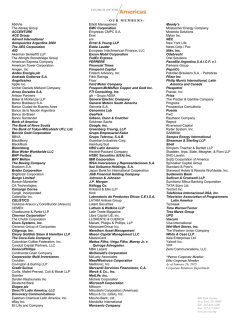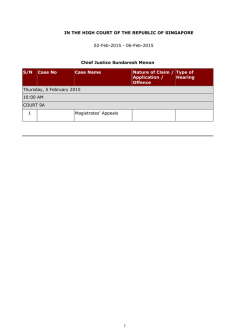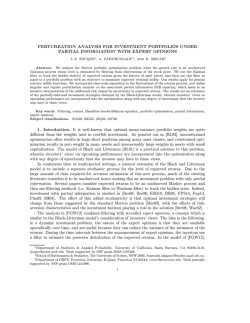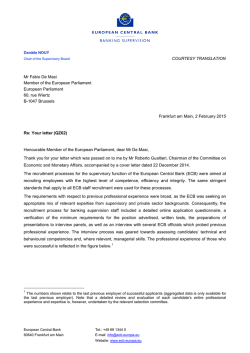
MoE cleans house and steps up supervision over Sino
MoE cleans house and steps up supervision over Sino-foreign cooperative
education programs and institutions
In October 2014, the Ministry of Education of the People’s
Republic of China ("MoE") publicly revoked the approval of 246
existing Sino-foreign cooperative education programs and
1
institutions below undergraduate degree level. This, and other
MoE issued reports, opinions and actions, indicate MoE's desire
to tighten supervision over joint programs and institutions in order
to better address its concerns regarding the quality of such
programs and institutions. In short, MoE is engaging in a major
house-cleaning exercise.
conducted by the MoE or its designee upon application for a new
program. This suggests that the MoE will apply stricter criteria
when approving new programs or institutions. Additionally, based
on anonymous telephone enquiries with the MoE, foreign
universities that are already offering an approved, degree-level
joint program, may not apply for a new venture until their current
program has (i) had one class successfully graduate from the
program and (ii) such program has undergone an inspection by
the MoE.
One example of the MoE's desires to tighten supervision can be
shown in its recent opinions, the MoE's Opinions on Further
Strengthening Quality Assurance Work related to Sino-Foreign
Cooperative Institutions for Higher Education issued on 10
December 2013 (the "Opinions"). In the Opinions, the MoE
placed the emphasis on strengthening quality supervision with
respect to Sino-foreign cooperative educational institutions and
programs, and described some of the means by which they would
bring about this goal. In particular, the MoE specified that:
Additionally, the MoE in a separate report (the MoE Brief (2014)
th
58 Issue) once again stressed its focus on the quality of joint
programs and institutions and MOE's aim to strengthen
evaluation. According to the brief, the MoE has conducted
regular evaluations on joint programs and institutions at an
undergraduate level or above since 2013, and has recently
started evaluation of the higher technical and vocational
education levels. The MoE specified in the brief that during
2013's national evaluation, 88 programs ceased operations due
to failure to satisfy the evaluation standards (note that this is
approximately ten (10) percent of the total undergraduate and
above joint programs or institutions).
(1)
(2)
(3)
(4)
a regular evaluation system, along with quality certification
standards and mechanisms for joint programs and/or
institutions shall be developed and perfected;
the examination and approval procedures for joint
programs and institutions with no legal person status shall
be simplified and streamlined;
strict restrictions will be imposed on joint programs and
institutions with average performance levels, foreign
institutions with multiple joint venture schools in China and
schools that offer majors that are relatively oversupplied in
China;
institutions or programs that: (i) violate national education
policies and relevant laws and regulations; (ii) fail to
satisfy education requirements and standards imposed by
law; (iii) fail to contribute the education resources as
agreed in Sino-foreign cooperative education
institute/program agreements; or (iv) fail to pass the
quality evaluation, shall be strictly investigated, a time
limitation for rectification imposed, and where the
circumstances are very serious, enrolment shall cease or
its approval shall be revoked.
Another example comes from existing regulations, which provide
that a foreign university with an existing joint program or institute
approved by the MoE must provide an evaluation report
1
As demonstrated by the MoE's Opinions, briefs and recent
actions relating to joint programs and institutions including the
recent revocation of hundreds of approvals, we believe that the
MoE will continue to step up its regulation of joint programs or
institutions going forward. However, it should be noted that
although the MoE has revoked approvals for numerous joint
programs and institutions, the MOE's approach is to curtail new
enrollments, with a policy to allow all enrolled students to
complete their programs.
Given the MoE's current stance towards joint programs and
institutions, foreign educational institutions that wish to engage
in cooperative operation of programs or institutions with
Chinese partners will need to focus more on enhancing the
quality of the educational services they provide and should bear
in mind that any such programs or institutions will be subject to
stricter evaluation and scrutiny going forward.
At this point, it is unclear whether the MoE will issue any new
regulations in this area. However, there is speculation that the
MoE has circulated the evaluation criteria to its provincial
branches internally, perhaps preparing the ground for new
regulations, but in any event, the trajectory of the MoE towards
stepping up controls on the quality of Sino-foreign educational
programs and institutions is clear.
http://www.crs.jsj.edu.cn/index.php/default/news/index/85
www.hoganlovells.com
"Hogan Lovells" or the "firm" is an international legal practice that includes Hogan Lovells International LLP, Hogan Lovells US LLP and their affiliated businesses.
The word "partner" is used to describe a partner or member of Hogan Lovells International LLP, Hogan Lovells US LLP or any of their affiliated entities or any employee or consultant with equivalent standing. Certain
individuals, who are designated as partners, but who are not members of Hogan Lovells International LLP, do not hold qualifications equivalent to members.
For more information about Hogan Lovells, see www.hoganlovells.com.
Where case studies are included, results achieved do not guarantee similar outcomes for other clients. Attorney Advertising.
© Hogan Lovells 2015. All rights reserved.
© Copyright 2026






